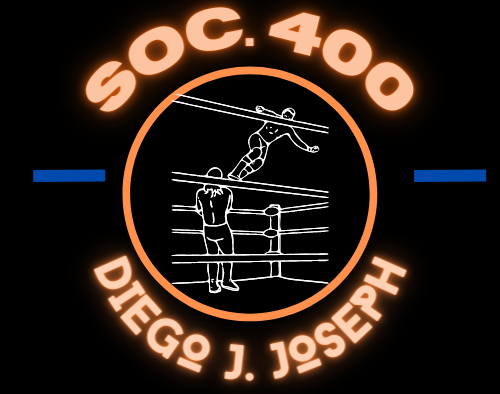One of the disturbing themes developed was analyzing how every time a wrestler of colour would be insulted or dealt with a racist remark it was delivered by a white wrestler. 99% of all the segments or matches coded for involved wrestlers of colour being stigmatized by popular white wrestler was delivering the line and the 1% occurred only by a wrestler with the same background as the wrestler of colour. An instance of this is within the March 3rd episode of Monday Night Raw in 2003, Triple H (a white identifying wrestler) referred to Booker T (a black identifying wrestler) “as an entertainer” and commanded him to “dance for him and entertain him” with his “nappy hair” and “suckas” (McMahon 2003). This became a trope that WWE in particular would use throughout time even to the point that the owner of the company Vince McMahon has used the N word on national television in a promo with another white identifying a wrestler, John Cena. Black identifying wrestlers were not the only marginalized group that were targeted by white wrestlers. In 2003, John Cena (2003) (white identifying wrestler) began rapping at a Latinx identifying Eddie Guerrero (2003), claiming he would be deported, and he was not a real American citizen and even referred to him as a “Wet****” due to his Mexican Heritage. (McMahon 2003). And so, based on the promo segments alone, it became evident that blatant racist and derogatory remarks used in professional wrestling were being delivered by a white wrestler and split between two reactions from the audience, as a comedic joke or as a way for the crowd to define who the face (hero) and heel (villain) were in the segment.
“Your job is to making people like me laugh. and you’re very good at it… with your nappy hair and your suckas”
– Triple H (Monday Night Raw 2003)
This instance between Triple H and Booker T would be one of the most obvious times where professional wrestling showed that there were writers that wanted to use race as something use against wrestlers, The confrontation between these two wrestlers in particular ultimately lead to the Booker T, the African American wrestler losing his match to Triple H in one of the most important wrestling shows of the year Wrestlemania. WWE was not the only company using terms such as “you people” and despite the audience from the previous segment cheering for Booker T, other wrestlers of colour did not experience the same hospitality. In TNA/IMPACT! Wrestling, Ron Killings (2004) spoke up against having white athletes outside of wrestling coming into the company. Killings was met with a lot of hostility from the Alabama crowd with boos and as Killings was being attacked by another white wrestler, the crowd showered said white wrestler with cheers and applause and later in the night beating Killings in a match, thus making killings, the villain of the story because he spoke on his racial identity and the racism he experienced in the company.
The pattern that I found throughout all of these moments was the idea that even when the wrestlers of colour were supported by the fans for being discriminated against, the white wrestlers would inevitably get the upper hand against them. It became a “winning the battle, but losing the war” situation.
